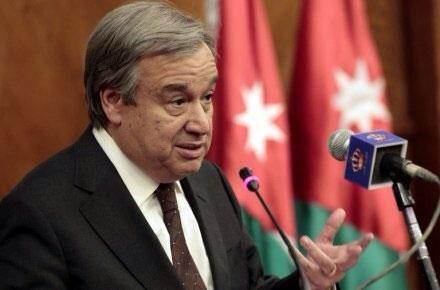You are here
Jordan, UNHCR need over $3b to cover Syrian refugee needs in 2015
By Khetam Malkawi - Jan 14,2015 - Last updated at Jan 14,2015
AMMAN — UN High Commissioner for Refugees Antonio Guterres on Wednesday reiterated his call on the international community to support Jordan to maintain its services for Syrian refugees.
Highlighting that the Kingdom is not receiving grants from the World Bank as it is classified as a middle-income country, Guterres urged “massive support” for Jordan.
Speaking at a press conference during his visit to the Kingdom to mobilise the international community to help Jordan in this crisis, the UN official said support should go to refugees, local communities and the government.
Investment, he noted, is needed in education, health and electricity to alleviate the impact of hosting 620,000 registered Syrian refugees and “this can’t be done without support from the international community”.
“Massive support is needed to victims of conflict,” the UN official stressed, noting that only 50 per cent of the needs to deal with the crisis were covered in 2014, but nothing yet so far for 2015.
According to the UNHCR website, the agency’s financial requirements for the region to deal with the Syrian crisis and provide humanitarian assistance for refugees are set at $1.89 billion.
As for Jordan alone, the agency says it needs nearly $404.4 million.
The Kingdom last month launched Jordan’s Response Plan of $2.87 billion that seeks to address the repercussions of the Syrian crisis for the year 2015, which makes the needs of the country and UNHCR Jordan over $3 billion.
During his visit, the UN official discussed the refugee crisis with Foreign Minister Nasser Judeh, Interior Minister Hussein Majali and Planning Minister Ibrahim Saif in separate meetings, the Jordan News Agency, Petra, reported.
The ministers highlighted the difficulties facing Jordan as it continues to host refugees despite limited resources and economic difficulties.
The refugee crisis, Majali said, has had a major impact on the Kingdom's education, labour, health, economy and security sectors, according to Petra.
Judeh stressed the importance of Jordan's partnership with the UNHCR and called for further international support for the Kingdom, especially as no political solution has been reached to restore peace to Syria so that refugees can return home.
Meanwhile, Guterres told reporters that two-thirds of Syrian refugee households in the country live below the poverty line, receiving less than $3 a day. He said the agency can hardly afford the basic needs for Syrian refugees due to “the lack of funds”.
He also announced the results of a study titled “Living in the Shadows”, about Syrian refugees in Jordan.
The report is based on data from home visits in 2014 to almost 150,000 Syrian refugees living outside camps in Jordan.
Almost half of the households researchers visited had no heating, a quarter had unreliable electricity and 20 per cent had no functioning toilets.
Rental costs accounted for more than half of household expenditures and refugee families were increasingly being forced to share accommodations with others in order to reduce costs, the study said.
The vast majority (84 per cent) of Jordan’s some 620,000 registered Syrian refugees live outside the country’s main refugee camps.
More worryingly, the report said, one in six refugee households were assessed as living in abject poverty, defined as those whose monthly expenditure is JD28 ($39.6) per person or less.
For female-headed households, the proportion living in abject poverty rises to one in five, indicating a higher level of economic vulnerability among this category of households.
Refugees who were registered with the UNHCR in earlier years show lower average expenditures than those who registered more recently, the authors of the study said, arguing that this indicates that refugees are becoming increasingly economically vulnerable over time as their resources dwindle.
Faced with greater hardship, refugees are resorting to various negative coping strategies to meet their basic needs. “The most common strategy is spending savings, as reported by more than half of respondents,” the report said.
The findings show that the poorest families are also the least likely to have assets to fall back on.
As the conflict in Syria enters its fourth year, the situation for many refugees is increasingly dire as savings and other resources become gradually depleted.
When compared with a previous study published in March 2014, the latest results show a clear deterioration in the overall situation of Syrian refugees.
“Income and expenditure for the majority of refugee households are now below the level needed to meet their most basic needs, leaving them increasingly reliant on humanitarian assistance,” the report said.
It added that since the beginning of the crisis in 2011, the Kingdom has opened its doors to Syrian refugees, and together with humanitarian organisations, has provided them with essential services and support. As the protracted nature of the refugee crisis is becoming more apparent, the sustainability of existing lifesaving networks is under threat, according to the report, which found that “it is clear that any reduction in the current levels of support will have immediate and serious consequences for Syrian refugees living in Jordan”.
Related Articles
UN High Commissioner for Refugees António Guterres postponed his visit to Jordan that was due on Thursday, after concluding a visit to Turkey.
UN High Commissioner for Refugees António Guterres is due in Jordan on Tuesday after postponing a visit that was scheduled last week.
UN High Commissioner for Refugees António Guterres is due to visit Jordan on Thursday to mobolise the international community to further help Jordan as it hosts Syrian and Iraqi refugees.















